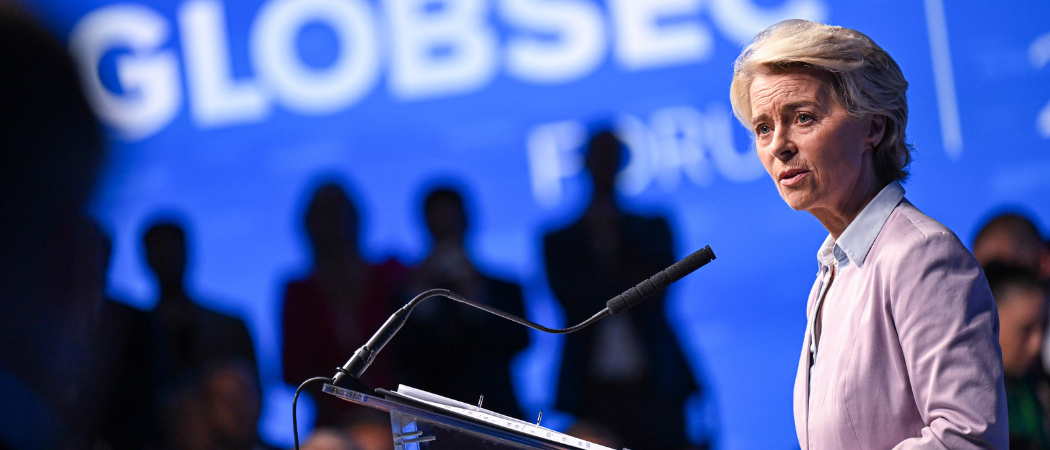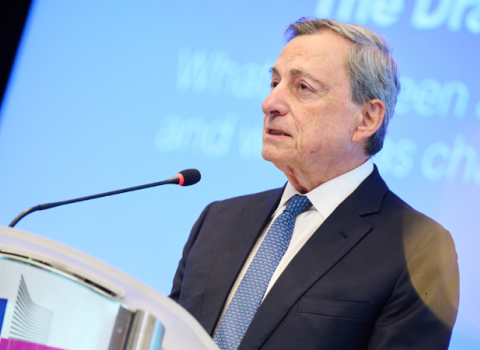Scientists call on Ursula von der Leyen to keep a distinct and strong portfolio for research and innovation

Ursula von der Leyen, President of the European Commission, during the GLOBSEC Forum, held in Prague, Czech Republic, on 30 August 2024. Photo credits: Dati Bendo / European Union
Stakeholders in the Brussels research and innovation bubble are fretting over who will be the next EU commissioner for research and innovation, as member states haggle over portfolios hoping for more political influence in the coming five years.
Scientists are swooping in the debate too. In a letter sent to the President of the European Commission Ursula von der Leyen, 19 Nobel laureates say the new college of commissioners should have a prominent portfolio for research and innovation.
The letter calls on von der Leyen to create a “well-funded portfolio dedicated to research and innovation” and to pick “a strong supporter of research” to take the helm of EU research and innovation policy. This will be a critical time for research with MEPs, member states and lobbyists readying for tough negotiations on Framework Programme 10 and the next multiannual budget.
The letter, drawn up by the Initiative for Science in Europe, is endorsed by the president of the European Academies’ Science Advisory Council, the president of the European Academy of Sciences, the president of Allea – All European Academies, the chair of the Young Academy of Europe, and the secretary-general of the League of European Research Universities.
Martin Andler, president of the Initiative for Science in Europe, said the next research commissioner will need to have a “strong personality with some [political] weight”.
On taking on her second mandate, von der Leyen promised to put research and innovation “at the centre of our economy”, pledging to increase EU research spending, and “expand” the European Research Council and the European Innovation Council.
Nobellists who signed the letter welcomed von der Leyen’s commitment to spend more on the two agencies, but said the central role of research and innovation in von der Leyen’s economic plan should be reflected politically in the composition of the next Commisson.
“Europe’s future depends on the quality of its research,” the letter says. “Any competitive edge in the form of world class researchers and universities will soon be lost without a clear focus on enhancing European research and securing a leading position for Europe in research and technology.”
Two former Italian prime ministers, Enrico Letta and Mario Draghi have been working on policy blueprints for how the EU can revive its economy. Letta published a report earlier this year calling for more investment in research and innovation to strengthen the EU single market.
Meanwhile, Draghi has also written a report on EU competitiveness, which is also expected to advocate for increased investment in science and technology. After some delays, he is presenting the report to leading MEPs and EU diplomats this week, with a full release scheduled for next week.
Research stakeholders hope the talk about the role of R&D investment in EU competitiveness will translate into a weighty portfolio for research and innovation in the new Commission.
The main message Andler said, is that the research commissioner should have a “strong personality”. The ideal candidate would have authority in the hierarchy of the college of commissioners.
Andler says the size of the portfolio is also important. In the outgoing Commission, the research and innovation portfolio was combined with education, youth and sport, giving the previous incumbent a collection of large files which, some critics say, proved to be too much for one commissioner to handle.
But not everyone agrees. Thomas Jørgensen, director for policy coordination and foresight at the European University Association (EUA), says, “We are pretty happy with the portfolio as it is now. We just need a commissioner with clout and political weight.”
Earlier this week, EUA released a statement saying research, innovation and education should remain under one commissioner with a strong political profile.
Fighting over the name and substance of the portfolio is not new. In 2019, research organisations and MEPs lobbied von der Leyen intensely to include the word ‘research’ in the title of Mariya Gabriel. Over 8,000 scientists, university heads and academics across Europe signed a petition, protesting von der Leyen’s decision to subsume education and research under a portfolio for “innovation and youth”. The name was later changed.
Who will get the job?
The rumour mill in Brussels is churning out potential names for a potential research and innovation portfolio, but negotiations with member states will go on until the last minute, with all 27 countries pursuing influential portfolios, and research not seen by many national governments as having big potential for influencing EU politics.
That being said, the name floated most frequently is Henna Virkunnen, a Finnish MEP, who was re-elected for a second term this year. In her previous mandate, she was a member of the European Parliament’s industry and research committee, ITRE. Before coming to Brussels, she was Finland’s education minister.
Czechia’s minister for trade and industry, Jozef Síkela might be the choice for a broader portfolio that covers industrial policy and R&D. At the same time, a report by German daily newspaper Die Welt suggests France’s Thierry Breton will be taking the role of commissioner for industry and strategic autonomy.
Jørgensen said the big risk in the current political negotiations is that research and innovation gets bundled into a bigger industry or competitiveness portfolio. “It would be difficult to have our voice heard,” he said.





 A unique international forum for public research organisations and companies to connect their external engagement with strategic interests around their R&D system.
A unique international forum for public research organisations and companies to connect their external engagement with strategic interests around their R&D system.